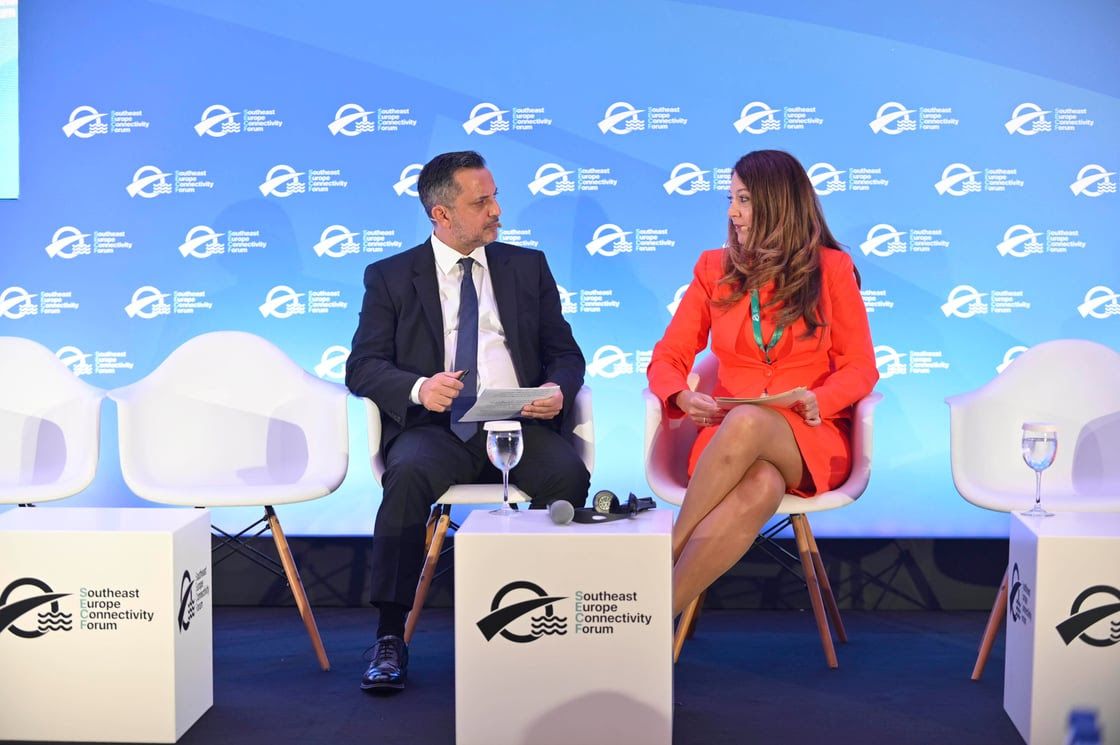A very interesting interview was granted by the Deputy Minister of Transport and Communications of Bulgaria, Ms. Anna Minheva-Natova to the journalist Nikos Karagiannis on behalf of ypodomes.com. Ms. Natova mentions the strong interest of Bulgaria in implementation of the railway connectivity between the seaports of Greece (Thessaloniki, Kavala and Alexandroupolis) and Bulgaria (Burgas and Varna), as well as the Danube River Port of Ruse and at what stage we are at this time. “It is an alternative cargo corridor to the congested Bosphorus /Dardanelles/ Straits, but also has a positive future perspective in relation to the reconstruction projects of Ukraine,” Ms. Natova says.
At the same time, Ms. Natova announced that the Sofia-Greece border highway, known as Struma Highway, is mostly complete, reducing the required travel time between Athens-Thessaloniki and Sofia. The challenge remains the last section of the motorway in the Kresna gorge, being the most difficult one from technical, environmental and economic point of view.
She also comments on the conditions for a Sofia-Athens passenger rail connection, as well as the projects running in Bulgaria in ports, airports and the Sofia metro. Below is the full interview.
What are the biggest transnational infrastructure projects between Greece and Bulgaria?
Anna Minheva-Natova: The Struma Motorway, the motorway between Sofia and the border with Greece (Promachonas), is completed, without the last section in the Kresna gorge. This last section has not been completed due to appeals from environmental organizations.
The second project that we are examining with great interest, is the project that connects the ports of Northern Greece and Bulgaria by rail (also known as Sea2Sea). In this case, each country will have to separately modernize and upgrade its own sections in order to be able to operate the axis Thessaloniki-Kavala-Alexandroupoli-Ormenio-Varna-Burgas and probably up to Ruse on the border with Romania.
The project is of interest to us as it is an alternative option to the Black sea route for the transport of cargo and also in the future for the reconstruction projects in Ukraine.
Do you think that the large trans-national railway project could be financed by European funds in the new financing program?
Anna Minheva-Natova: What I know is that the Minister of Finance of Bulgaria has guaranteed an amount of 6 billion euros in the next year budget for the entire trans-European corridor which will connect Greece, Bulgaria and Romania. What has been agreed between Greece and Bulgaria is that it will proceed with financing not wait for EU funds, as I said each country will undertake its own section. For now, some working groups should be established in order to lead us to the signing of the intergovernmental Agreement between the three countries.
Do you have underway or planned other port or airport projects ?
Anna Minheva-Natova: We have several projects on our agenda for port projects for both basic infrastructure and land-based projects. An important project that we are promoting is a dredging project of the port of Burgas and the related contract of €35 million has just been signed by the Port Infrastructure Managing Body which is state-owned enterprise.
At the airports we are considering concession cases but we have not come to any decisions.
The Metro in Sofia has developed and expanded quite a bit in recent years. Do you have any new extension plans?
Anna Minheva-Natova: The Metro is one of the 10 largest infrastructure projects in the EU and indeed there is an extension plan for a new line and we are partially funding it from Operational programme “Transport and transport infrastructure”. Metro projects help to move around the city in a more sustainable way.
Do you think there could be a passenger rail connection between Athens and Sofia (and Thessaloniki)?
Anna Minheva-Natova: This is a very interesting question. The development of a coherent and seamless transport between neighbouring countries is a significant challenge and a great opportunity which requires very good coordination and cooperation. Firstly, we have to manage to upgrade the sections of this line as countries and buy new trains that will improve significantly the quality of the passenger transport service provided and will increase its attractiveness and share of transported passengers in the railway segment between the two countries, then we could think about the passenger connection between Sofia and Athens. To connect Sofia and Atherns – is still a dream but I believe it is visible.
ΜΗΝ ΞΕΧΑΣΕΤΕ
- Ακολουθήστε το ypodomes.com στο Google News και μάθετε πρώτοι όλες τις ειδήσεις για τις υποδομές στην Ελλάδα
- Δείτε την εταιρική μας σελίδα στο LinkedIn
- Εγγραφείτε στο Newsletter μας, για να λαμβάνετε κάθε εβδομάδα στο email σας τα δημοφιλή άρθρα μας
